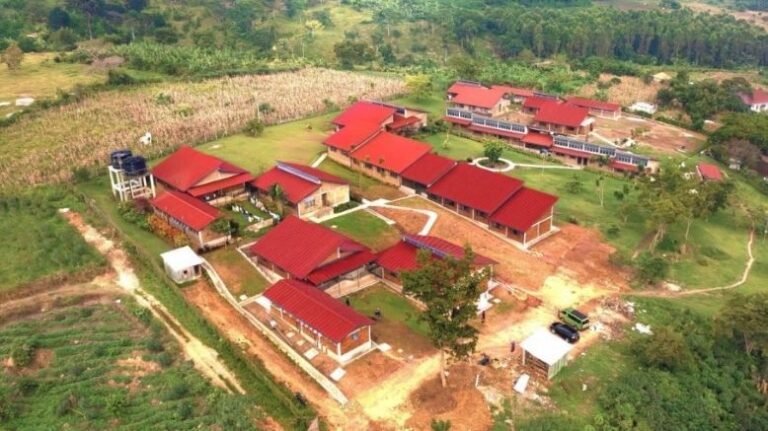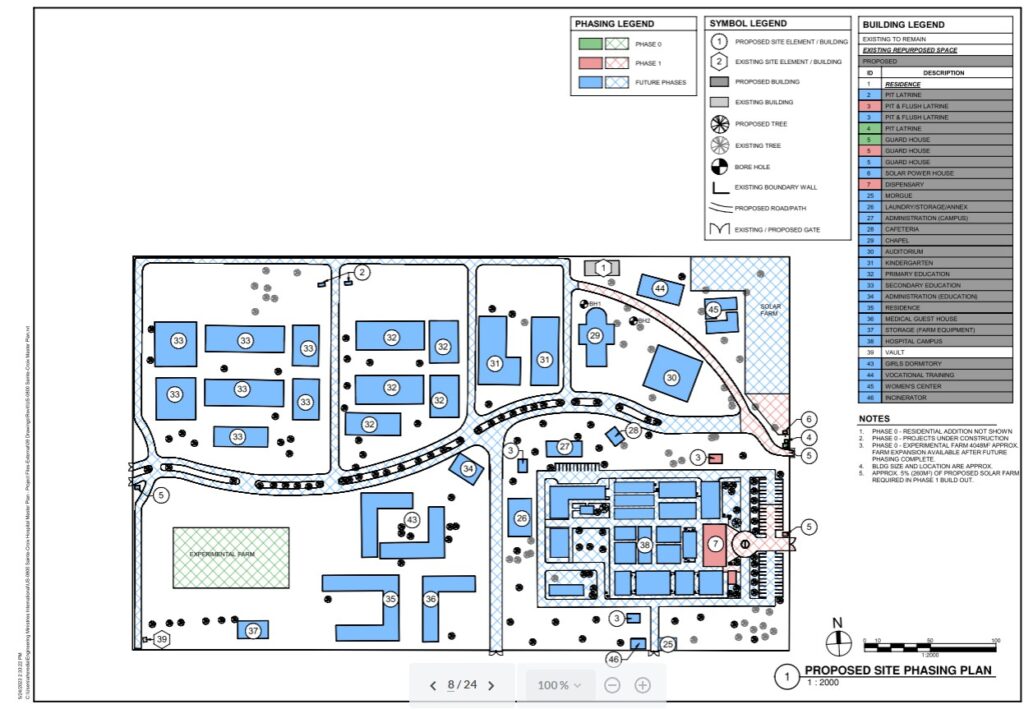— 5 min read
Delivering Construction Projects Safely and Consistently in Developing Countries



Last Updated Dec 16, 2025

Moses Clark
Project Manager
Moses Clark is a Project Manager at EMI World, where he manages construction projects, project development, and supports programs across West Africa as part of the US Engagement team. Before joining EMI, Moses spent six years in Portland, Oregon, working for a commercial general contractor as a project engineer/project manager within the special projects department. He has been with EMI since 2018, starting as the Construction Manager in Senegal to launch a Construction Management (CM) program in West Africa. Born and raised as a missionary kid in Cameroon, West Africa, Moses has a deep connection to global ministry. His early experience includes internships focused on construction and community development in the US, Haiti, Tanzania, and Nigeria between 2012 and 2016. Moses currently resides in the greater Atlanta area with his wife Megan, and their daughter Halimatu.

Jim Pocock
Professional Development Manager
Jim Pocock is the Professional Development Manager at EMI World, and brings extensive experience from a career combining engineering, architecture, project management, and teaching. Jim began his career as a civil engineering officer in the U.S. Air Force. He served 20 years on active duty in a wide variety of assignments and locations. His roles included architecture, environmental engineering, project management and teaching. He spent time overseas in many countries including 3 years in the Netherlands. Jim ended up at the Air Force Academy and continued his career there as a civilian professor in the Civil & Environmental Engineering Department for another 20 years. He is also a licensed architect. Jim served colleagues and cadets in ministry roles within the Air Force and in his church. Once he learned about eMi he was eager to combine his faith and professional skills by volunteering. He was a short term volunteer on several project teams, and in 2016 he and his wife spent a year with eMi Uganda. After retiring from teaching at the Air Force Academy, Jim joined eMi as part-time staff in 2021. Jim and his wife Anne have been married for over 40 years. They have three grown sons; Bryant, Spencer and Kyle, who all live nearby in Colorado. Jim and Anne still have many family connections in Michigan where they both grew up.

James Hamilton
Writer & Producer
85 articles
James Hamilton is a writer based in Brooklyn, New York with experience in television, documentaries, journalism, comedy, and podcasts. His work has been featured on VICE TV and on The Moth. James was a writer and narrator for the show, VICE News Tonight, where he won an Emmy Award and was nominated for a Peabody Award.
Last Updated Dec 16, 2025

Delivering projects in developing countries can build local capacity, expand critical infrastructure, and align with mission and values. But international delivery projects add unique challenges that can easily derail even the best-designed projects: dispersed teams, country-specific codes, multilingual workflows, and uneven tech access.
EMI (Engineering Ministries International) is a Christian nonprofit that provides architecture, engineering, and construction management services in developing countries. The organization has completed more than 2,000 projects in over 100 countries, ranging from small renovations to full university campuses and hospitals.
EMI Project Manager Moses Clark and Professional Development Manager Jim Pocock discuss some practical steps to make safety, quality, and communication repeatable in places where consistency is hardest to achieve.
Reduce Variables: Create a Single Project Record
The more distance, languages, and unfamiliar codes are involved, the greater the need for a centralized user-friendly platform for the latest approved information. This leads to fewer mix-ups, cleaner handoffs, and clear audit trails.
On a hospital project in French-speaking West Africa, EMI built a single project record for drawings, specs, codes, photos, meeting minutes, RFIs, and decision notes. They reduced confusion by standardizing the folder structure, storing files in French and English, and setting role-based permissions.
“Having a project management tool that is web-based and mobile-friendly opens the door for clients who don't have a computer at all, or who don’t have a computer with the power to download AutoCAD or BIM or other heavy software tools," says Moses.
"The main thing is keeping projects going and on schedule, keeping communication chains and channels open, without ever being limited by access to computers.”

Reduce Risk: Align safety and quality with local codes.
Cross-cultural safety and quality relies on two moves: set standards that are enforceable and buildable, then confirm they align with local codes and laws.
In new contexts, EMI defines minimum safety and quality thresholds and collaborates with local architects and engineers to align design with country standards.From there, they develop the scope to budgets and contractor capability, so the design can be executed and maintained.
Start Strong: Structure the bid and kickoff to set expectations.
Discipline in the beginning reduces costly resets down the line. Front-loaded alignment creates clear accountability from day one, and makes life easier: questions get answered, decisions have owners, and information stays organized.
On the Holy Cross hospital project, EMI issued an open bid to 10 local contractors with a 23-page tender, ran multi-round virtual interviews, and held an in-person kickoff with the owners and architects. Roles, deliverables, and meeting cadence were clarified before design progressed.
“Clients connect with us," Jim explains. "They might run an orphanage or a mission hospital or a school. They ask for our services and we bring together a team of staff, interns, and volunteers."
"We go to the site when we can, do an on-site visit to get to know the client, and then provide them with resources. That’s our process: everyone should be on the same page. It sets them up to succeed."
Keep Teams Aligned: Have consistent, bilingual meetings.
Global collaboration needs predictable communication.
Standing weekly meetings with multilingual interpretation keep everyone informed and give teams a structured forum for questions and problem-solving. Logging written summaries and next steps for all stakeholders further improves efficiency and follow-through.
Over a 13-month project, EMI coordinated over 100 discipline-specific Zoom calls with French/English interpretation and RFIs, keeping changes visible. The final product was a polished 218-page detailed design package.
Build a toolset as you go.
Adoption sticks when teams master the basics first. Start with document management and RFIs, then layer submittals, cost, and scheduling as familiarity grows.
This builds durable habits, maintains standardization, and reduces tool fatigue. In some cases, EMI scheduled meetings externally and logged meeting minutes and documents back into the central record.
“You can advance to other features as learning comes along but just having one, clean, clear organized space to put the most important documents helps a great deal," Jim says. "Not all our offices are ready to use some advanced features. But having document management, a place to store drawings, and to keep track of meeting minutes and submittals is great.”
Invest in People: Train local teams and pair fast adopters.
Capacity building creates lasting impact in communities. It’s also a delivery strategy. Training and empowering local professionals improves quality, lowers travel costs, preserves continuity after handover, and solves problems with local methods and materials.
“You can’t give everybody a computer. You can’t give everybody Microsoft Suite or a CAD license. That’d be great, but it also isn’t the solution," says Moses.
As professional development investment, EMI provided entry-level training to the architectural firm and paired quick adopters with peers to spread knowledge in the local language and context.
"What you can give people is information and training. Teach them how to build and to share information, how to communicate with a client so that a structural engineer in West Africa can communicate with a structural engineer in Houston. In other words, teach people how to fish," Moses says.
Working in developing countries often adds new, different project variables — different units of measurement, bilingual document sets, and translation time — that can lengthen certain cycles.
Accepting that multi-country projects take more coordination and design time can preserve momentum and reduce rework.
Stay updated on what’s happening in construction.
Subscribe to Blueprint, Procore’s free construction newsletter, to get content from industry experts delivered straight to your inbox.

Make a Lasting Impact: Plan for what happens after handover.
Moses Clark put it simply: “People are more important than projects.”
That shapes project delivery — and what happens after. Improvements stick when continuity is part of the plan: publish a lightweight owner’s guide for partners, pair visiting experts with local professionnals, and codify what should be sustained after turnover— standards, training, and governance.
EMI models this by sharing public design guides and open webinars, pairing visiting experts with local professionals, and offering continuing-education credit to keep skills growing.
In sensitive contexts, they protect identities and locations and route materials through communications review before publishing. Completion is only a milestone. What follows has to be effective monitoring, maintenance, and continual improvement.
“When you see these projects, you see architects, engineers, design professionals from all over, coming together, and then, in one week to 10 days, producing a concept-level drawing and a master plan. It blows people’s minds," Moses says.
"It’s a celebration of the world. It’s a celebration of diversity. It’s a celebration of people’s skills and the gifts they bring to the table.”
Was this article helpful?
Thank you for your submission.
0%
0%
You voted that this article was . Was this a mistake? If so, change your vote
Scroll less, learn more about construction.
Subscribe to The Blueprint, Procore’s construction newsletter, to get content from industry experts delivered straight to your inbox.
By clicking this button, you agree to our Privacy Notice and Terms of Service.
Thank you!
You’re signed up to receive The Blueprint newsletter from Procore. You can unsubscribe at any time.
Categories:
Written by

Moses Clark
Project Manager | EMI World
Moses Clark is a Project Manager at EMI World, where he manages construction projects, project development, and supports programs across West Africa as part of the US Engagement team. Before joining EMI, Moses spent six years in Portland, Oregon, working for a commercial general contractor as a project engineer/project manager within the special projects department. He has been with EMI since 2018, starting as the Construction Manager in Senegal to launch a Construction Management (CM) program in West Africa. Born and raised as a missionary kid in Cameroon, West Africa, Moses has a deep connection to global ministry. His early experience includes internships focused on construction and community development in the US, Haiti, Tanzania, and Nigeria between 2012 and 2016. Moses currently resides in the greater Atlanta area with his wife Megan, and their daughter Halimatu.
View profile
Jim Pocock
Professional Development Manager | EMI World
Jim Pocock is the Professional Development Manager at EMI World, and brings extensive experience from a career combining engineering, architecture, project management, and teaching. Jim began his career as a civil engineering officer in the U.S. Air Force. He served 20 years on active duty in a wide variety of assignments and locations. His roles included architecture, environmental engineering, project management and teaching. He spent time overseas in many countries including 3 years in the Netherlands. Jim ended up at the Air Force Academy and continued his career there as a civilian professor in the Civil & Environmental Engineering Department for another 20 years. He is also a licensed architect. Jim served colleagues and cadets in ministry roles within the Air Force and in his church. Once he learned about eMi he was eager to combine his faith and professional skills by volunteering. He was a short term volunteer on several project teams, and in 2016 he and his wife spent a year with eMi Uganda. After retiring from teaching at the Air Force Academy, Jim joined eMi as part-time staff in 2021. Jim and his wife Anne have been married for over 40 years. They have three grown sons; Bryant, Spencer and Kyle, who all live nearby in Colorado. Jim and Anne still have many family connections in Michigan where they both grew up.
View profile
James Hamilton
Writer & Producer
85 articles
James Hamilton is a writer based in Brooklyn, New York with experience in television, documentaries, journalism, comedy, and podcasts. His work has been featured on VICE TV and on The Moth. James was a writer and narrator for the show, VICE News Tonight, where he won an Emmy Award and was nominated for a Peabody Award.
View profileExplore more helpful resources

6 Tips to Turn Construction Culture Into Daily Practice
Every construction company has a culture. Whether it’s intentional or not. The difference lies in how that culture shows up on the job. In the first article of this series on...

Turning Values into Workflows: How a GC Firm Operationalized Culture
Culture isn’t just about what companies believe — it’s about how those beliefs show up in day-to-day work. When culture is embedded into operations, it becomes something teams can rely...

How a Successful GC Firm Turned Personalities into Culture
The culture at Ryan Gootee General Contractors (RGGC), a successful construction firm based in New Orleans, was never something the company had to invent. It was always there. Woven into...

Rise of the Super-Sub: Mastering Supply Chain & Logistics for Offsite Construction
Modern construction projects come with ever-increasing demands. Owners want to see more complex builds completed on tighter schedules. At the same time, general contractors (GCs) face challenges like the ongoing...
Free Tools
Calculators
Use our calculators to estimate the cost of construction materials for your next project.
Templates
Find a template to help you with your construction project tasks.
Material Price Tracker
Get the latest U.S. retail prices and view historical trends for common building materials.
Glossary
Explore key terms and phrases used in the industry.
